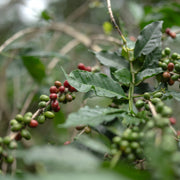High-quality coffee is no accident—it relies on the careful attention of people at every level of the journey from seed to cup.
At Counter Culture Coffee we talk a lot about transparency. Through our annual Transparency Report, educational programs, and public coffee events like Tasting at Ten, we make ourselves available to share information, talk openly about our work, and answer any questions you may have. One of the most opaque aspects of the coffee industry, though, is the supply chain, or as we call it, the value chain.
While we are all familiar with the term “supply chain,” at Counter Culture Coffee, we have adopted the term value chain instead. Language is important and this terminology is more inclusive to the role everyone plays in producing coffee. At every part of the process, value is added to this seed that we brew into our favorite drink. So, just exactly where does coffee come from and what is the journey like from bean to cup? Who are the actors involved in this process, and what are their jobs? Let’s find out!
This infographic allows us to visualize this complex system. As you can see, there are many iterations of how coffee might flow through our value chain and different levels of communication and involvement between the participants at each step. Yet, the main actors remain the same no matter what you are looking at: farmer, wash station / cooperative, exporter, importer, roaster, and retailer / consumer.

Coffee Farms

Like with most agricultural products, it all starts on the farm. Coffee farms are always located in a tropical zone, at varying altitudes. The work of a coffee producer varies throughout the year.
Immediately after the harvest, there is a period of maintenance, pruning, and stumping coffee bushes. On small farms, family owners and perhaps their neighbors perform the maintenance, while a larger operation may employ laborers.
Nine months after the rainy season, the coffee plant starts to develop cherries. As that fruit ripens, pickers go into the fields daily, selecting only the ripest fruits for harvest. No matter the size of the farm, harvest time requires extra labor for picking. This job is done by hand over the course of weeks, so even smaller farms usually hire outside help.
Cooperative / Washing Station

After the coffee cherry is picked, it needs to be processed. Processing is the word we use to describe the removal of the seed from the skin and the inner fruit. This is either done by the producer on the farm, or at a washing station.
The washing station is responsible for proper processing, storage, and delivery of the coffee to an exporter. If the farmer is a part of a cooperative, it will often, but not always, operate the washing station. In addition, co-ops usually offer coffee growing and processing education, sell supplies to farmers, and often do some of the marketing and quality control for the coffee that it manages. If the producer does their own processing but is a member of a cooperative, they will then deliver their coffee to a warehouse for storage and eventual transfer to an exporter.
Exporter

The exporter has one obvious role–to properly prepare the coffee for export. They handle the legal processes in the country of origin that allow coffee to be loaded on a boat for overseas shipping. The exporter is responsible for a variety of other tasks: storing the coffee before export, the final stage of processing at a dry mill, quality checks, arranging transportation, and further marketing of the coffee if it doesn’t yet have a buyer.
Importer

Once the coffee is aboard a boat, it’s in the care of the importer. The importer’s main role is getting the coffee safely to its destination. They also make sure all of the necessary paperwork is filed so that the coffee can pass through customs and into proper storage as quickly as possible. The importer is also responsible for quality control, marketing the coffee to roasters, and then transporting it to the buyer.
Roaster

Counter Culture Coffee’s role in the value chain is as a roaster. We roast, package, and ship coffee from our roasteries in Durham, NC and Emeryville, CA and then sell coffee as a wholesaler and online retailer to coffee shops and consumers. Yet, we also work very closely with all of the aforementioned members of the value chain to expedite great coffees through the value chain. A more efficient process leads to fresher, better-tasting coffees. Our active role also permits us to gather more information and offer more transparency into the entire process.
Retailer / Consumer

Finally, let’s not forget YOU, the coffee drinkers. At Counter Culture Coffee, we sell our coffee in three main ways: online, in grocery stores, and to coffee shops across the country. Chances are, you are never far from finding our coffee near you. Whether you are sipping on a cup you brewed at home or enjoying a cappuccino carefully crafted by your local baristas, consumers are as important a member of this value chain as anyone else. Roasters, farmers, importers, and exporters rely on your valuable feedback to understand how better to produce coffees that you’ll appreciate and want to drink.
A knowledgeable consumer is powerful. We hope you will use this information to ask more questions and get to know more about where your coffee comes from. Know your coffee!






